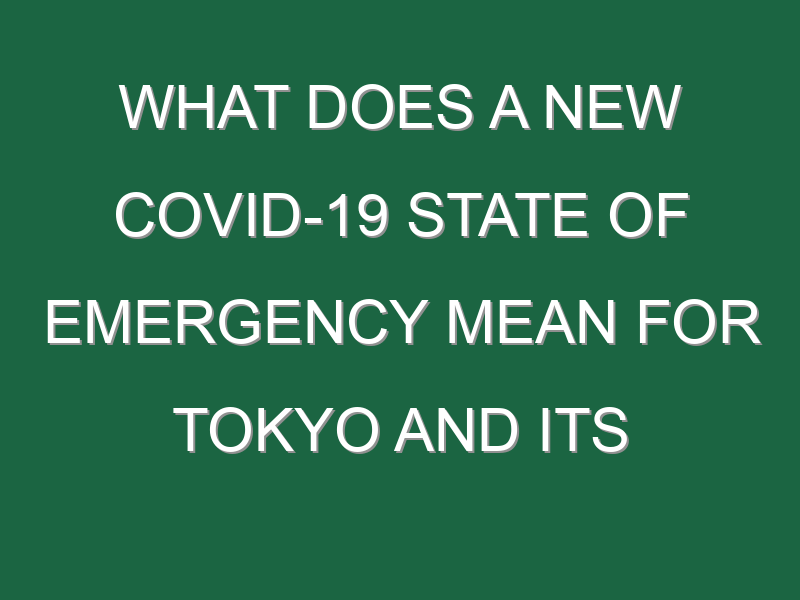Our mission to make business better is fueled by readers like you. To enjoy unlimited access to our journalism, subscribe today.
Japan Prime Minister Suga Yoshihide implemented a state of emergency in Tokyo on Thursday, nearly a week after the capital’s governor pleaded with the central government to increase precautions in the city to combat a sudden spike in COVID-19 cases.
Under the state of emergency, which comes into effect at midnight and will remain in place until at least Feb. 7, Tokyo is asking restaurants to close at 8 p.m., for citizens to stay at home, and for businesses to let staff work from home.
Suga has called the restrictions “limited and concentrated” as his government, like all others, struggles to balance protecting public health against maintaining the economy.
Japan’s economy reversed three consecutive quarters of contraction in the July-September quarter last year, rising 5% over the same period in 2019. Economists still predict national GDP will contract 5% in the fiscal year ending April 2021, but it could rebound with over 3% growth the following year. If, that is, the pandemic is well-contained.
Subscribe to Eastworld for weekly insight on what’s dominating business in Asia, delivered free to your inbox.
“We will take measures that are most effective at preventing the virus spread rather than shutting down economic activity across the board,” the minister in charge of Japan’s virus response, Yasutoshi Nishimura, said on Thursday. “We are determined to bend the curve during the emergency declaration period.”
Japan is currently riding a new wave of coronavirus cases, logging a record 4,520 new coronavirus cases last Thursday. Cases topped that record again on Tuesday, with 4,912 new infections. The current surge in COVID-19 is primarily in the nation’s capital, Tokyo, which reported 2,447 new cases Thursday—the capital city’s highest daily rate to date.
Besides Tokyo, the prefectures of Chiba, Kanagawa and Saitama which surround the capital will enter a state of emergency too. Japan last declared a state of emergency in April 2020, equipping prefecture-level governors with special powers, such as the ability to requisition food, medical supplies and land.
Until case numbers starting rising again in November, Japan had managed the coronavirus without issuing broad lockdown measures like those seen in many Western countries. In fact, even under emergency legislation, Japan’s governors have no legal right to curtail people’s movement or the operation of business. At most, the prefectural governments can request that restaurants close early, that people stay indoors, and that businesses deploy work-from-home schemes.
There is no punishment for those that don’t comply, although Suga has sought to amend laws that would allow the government to penalize transgressors and provide financial assistance to businesses that do comply.
According to think tank Dai-ichi Life Research Institute, a month-long shutdown could cost Japan some $16.5 billion in consumer spending. While the state of emergency is currently due to end in four weeks, contagion models from Kyoto University suggest it will take two months of enhanced restrictions to bring COVID-19 cases down to manageable levels.
With just under 200 days until the rescheduled Tokyo 2020 Olympics are due to commence on July 23, a prolonged lockdown in Tokyo threatens to scupper Japan’s Olympic dreams entirely.
When former Prime Minister Abe Shinzo reluctantly postponed the Games in March last year, he said that 2021 would be Japan’s final chance to host the 2020 Olympics. International Olympic Committee president Thomas Bach seemed to agree.
“Quite frankly, I have some understanding for this, because you cannot forever employ 3,000, or 5,000, people in an Organizing Committee,” Bach told the BBC in an interview last May. “You cannot every year change the entire sports schedule worldwide of all the major federations. You cannot have the athletes being in uncertainty.”
The Tokyo 2020 Olympics are already the most expensive of any Summer Games in history, according to a November study from the University of Oxford. The event is also spectacularly over budget. Japan initially earmarked $7.5 billion for the cost of hosting the sports meet in 2013. Last month, organizers said that figure had more than doubled to $15.4 billion, with the year-long delay contributed $2.8 billion to the growing costs.
On Monday, Suga pledged Tokyo would host the Olympics as scheduled, presenting the sports meet as an aspirational “proof that people have overcome the coronavirus.” To get there, Suga said vaccine approvals would be sped up so that rollout can begin in February rather than March.
Countries that have already begun distributing vaccines, however, are finding it difficult to scale rollout effectively. National inoculation is proving a slow process, and the Olympics also has to contend with safely managing thousands of foreign athletes, support staff, media, and spectators descending on Tokyo from around the world.
In an interview with Japan’s Nikkan Sports, president of Japan’s Olympic Organizing Committee Yoshiro Mori said Japan will have to decide by May whether foreign fans are welcome to attend the Olympics in July. Inbound tourists are currently blocked from the country entirely.
While economists question whether Olympic-related tourism is really a boon for host nations, blocking overseas fans would likely cut the revenues the Tokyo Games earn from ticket sales. Even Japanese nationals seem skeptical about the event. In a survey run last year by Japan’s national broadcaster NHK, 30% of respondents thought the games should be cancelled.
More politics coverage from Fortune:
- The biggest conspiracy theories of 2020 (and why they won’t die)
- Under Biden, expect more scrutiny of Big Tech and mergers
- Why a key Georgia county flipped from red to blue—and what it means for Democrats
- Pfizer, Trump, and Biden: A twisted triangle that’s complicating COVID-19 relief
- Biden’s first 100 days: Student loan debt won’t go anywhere




